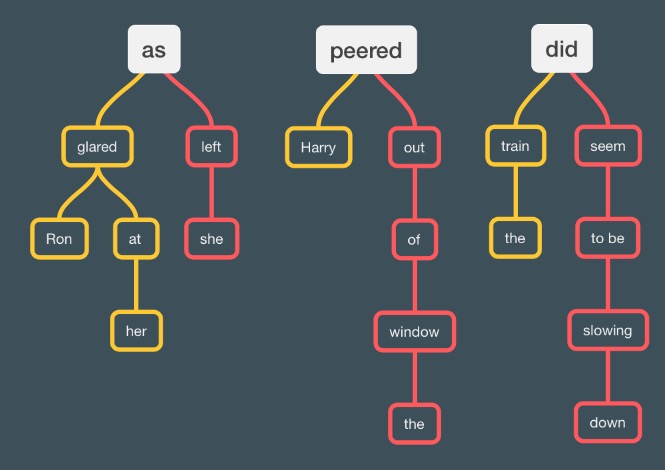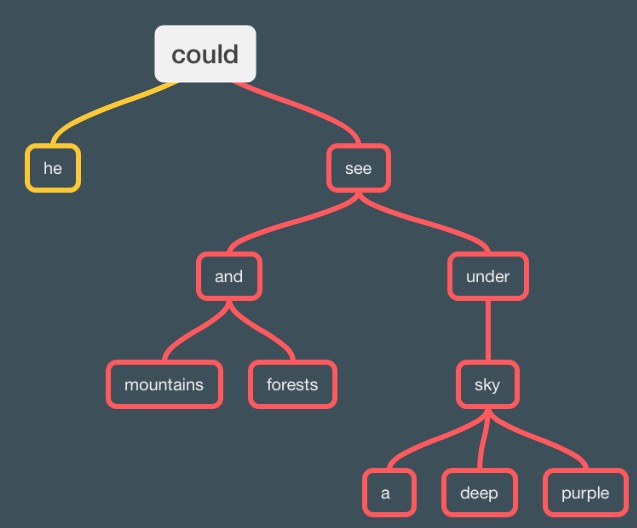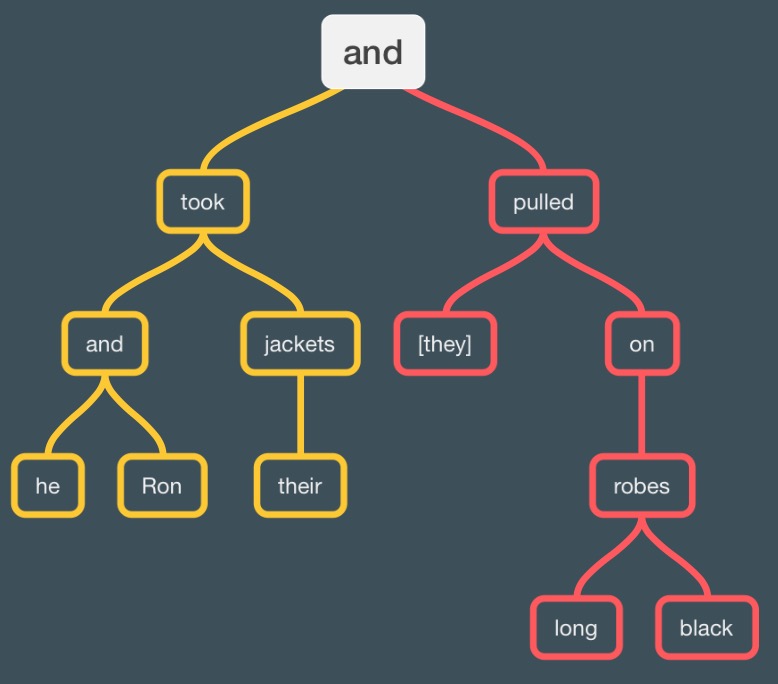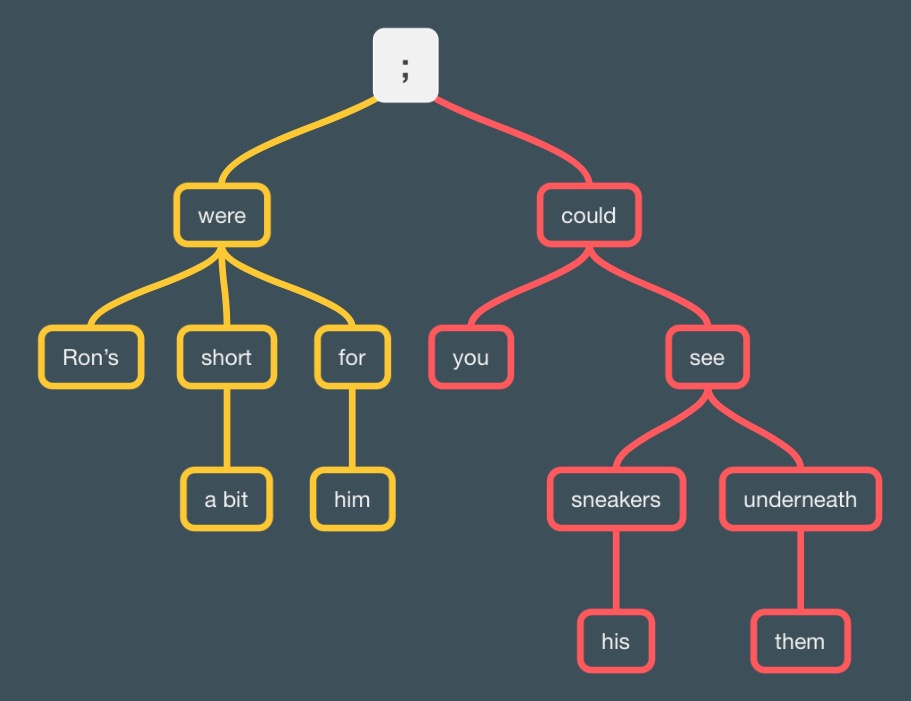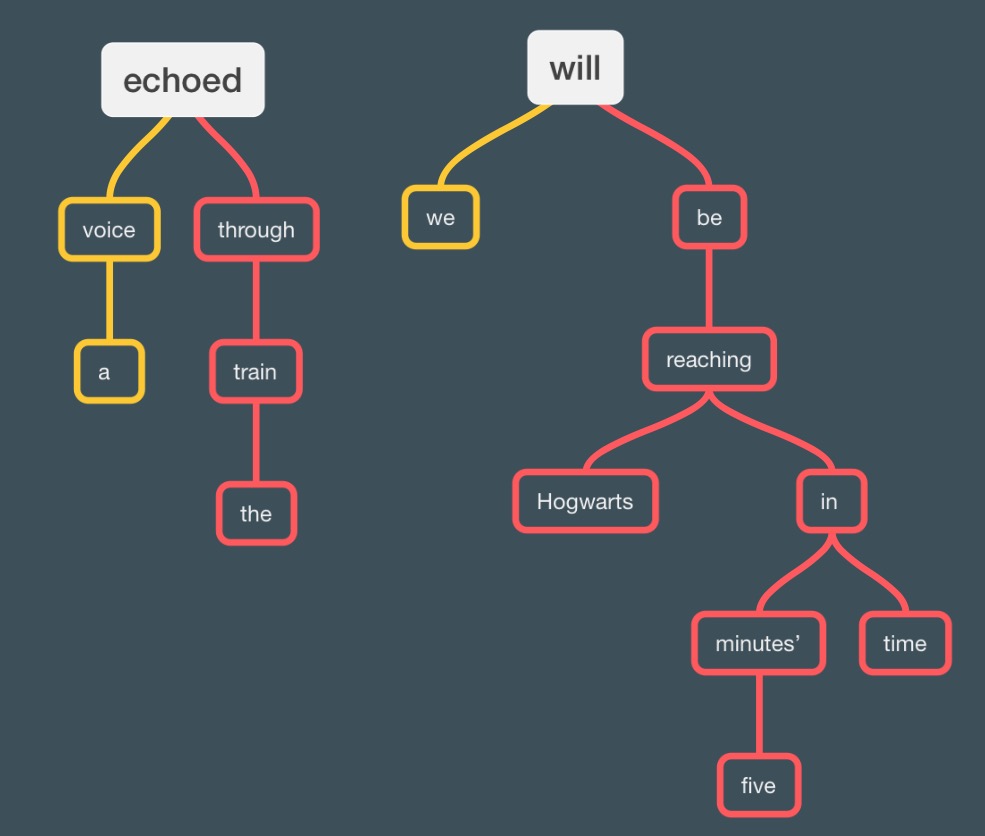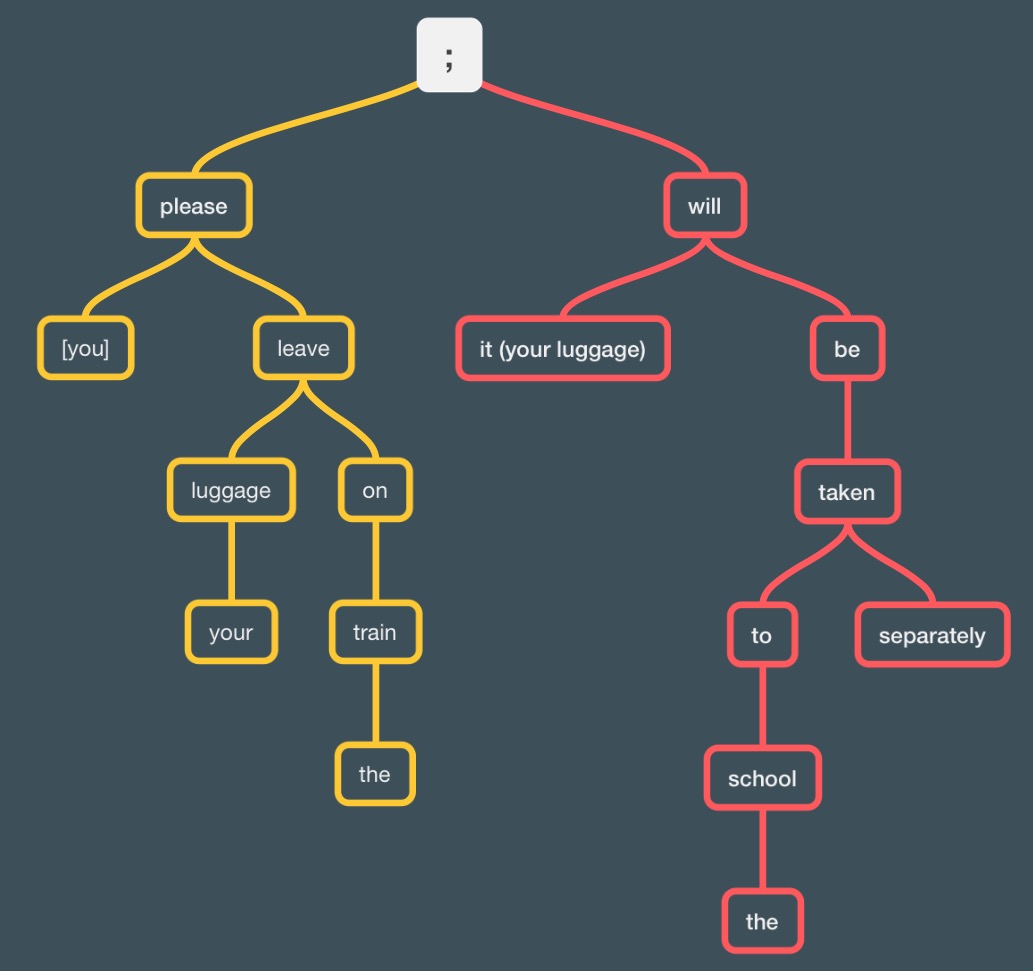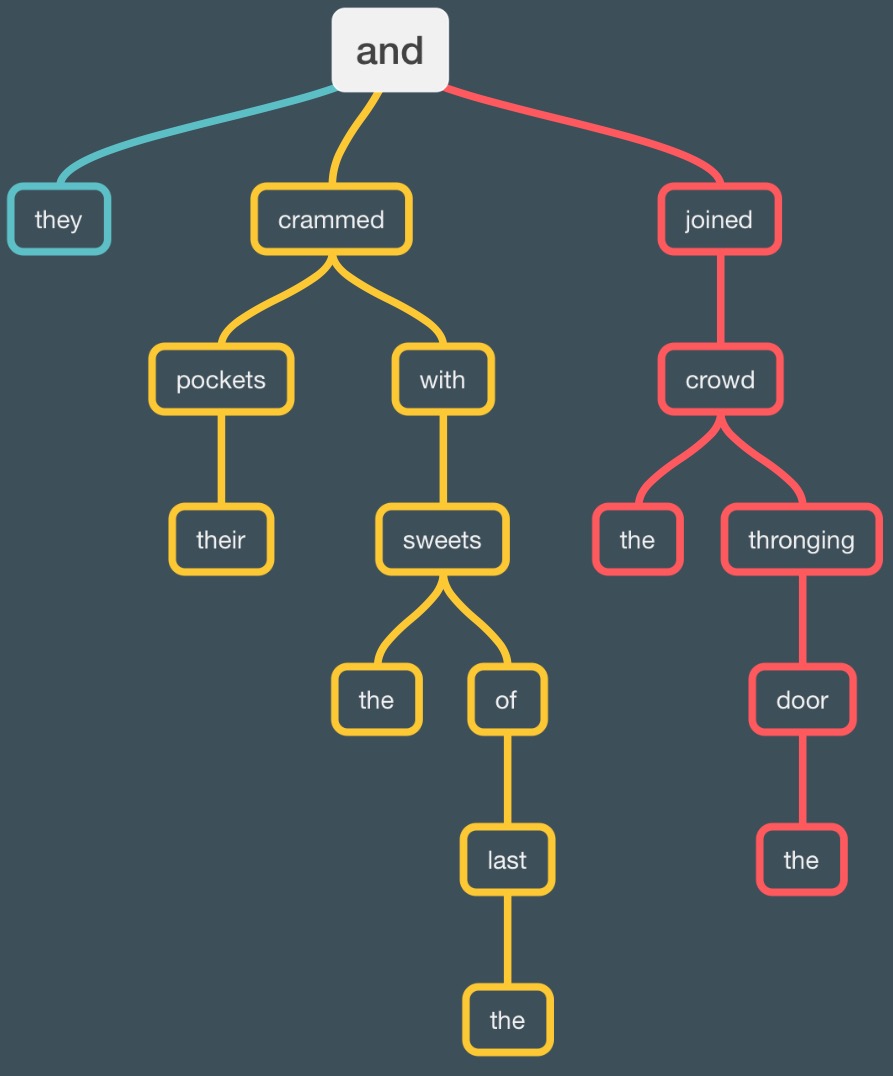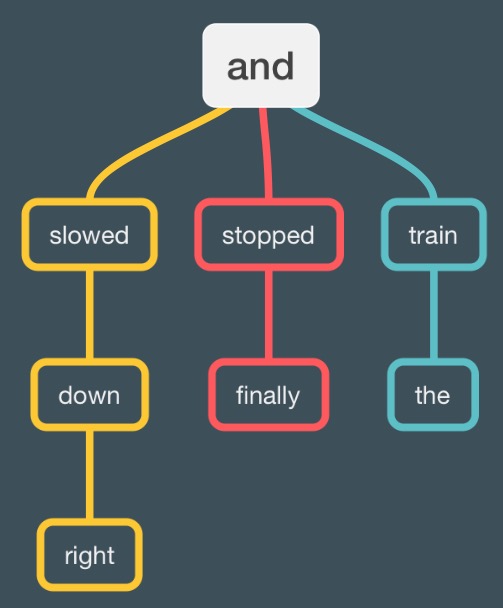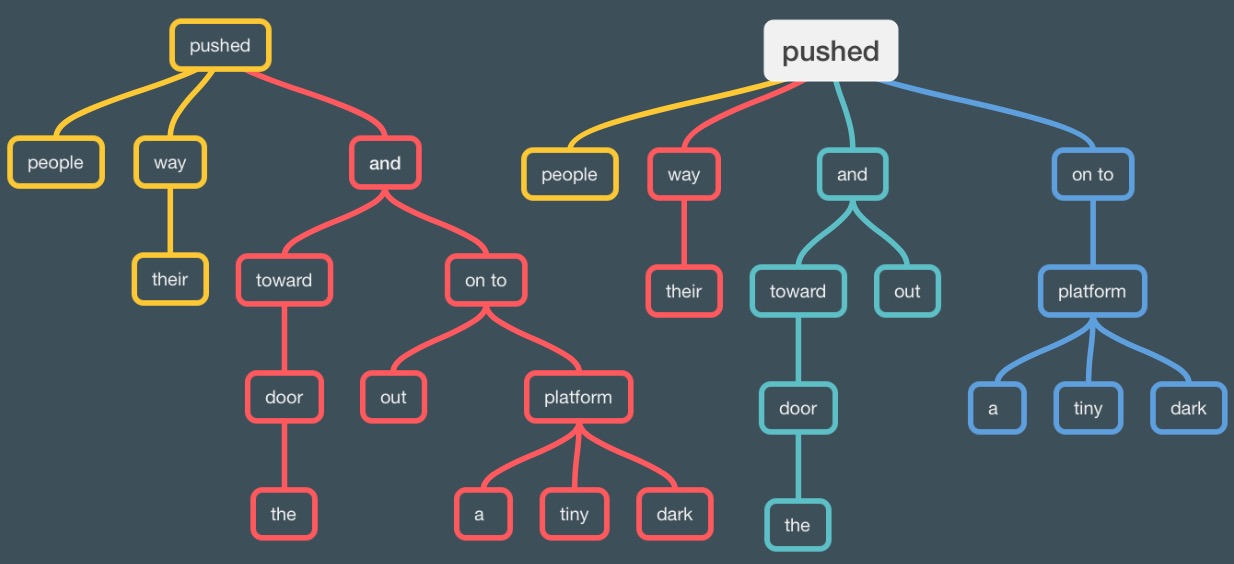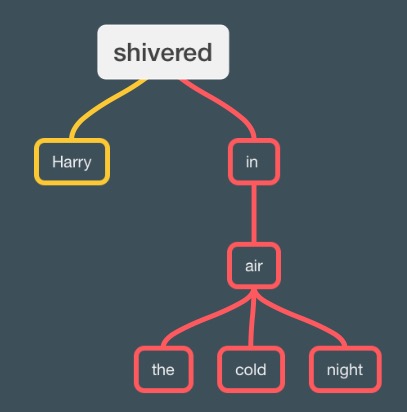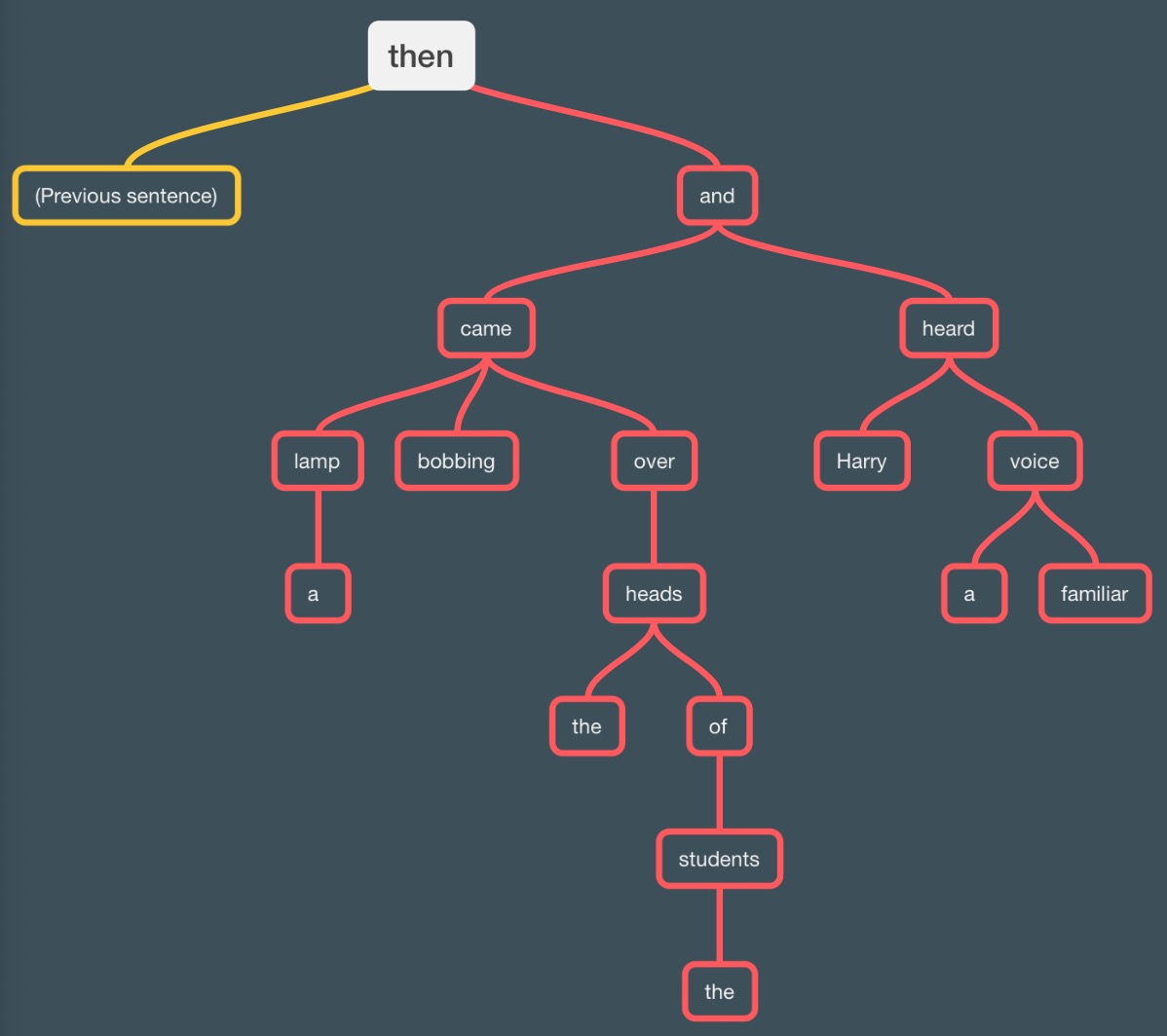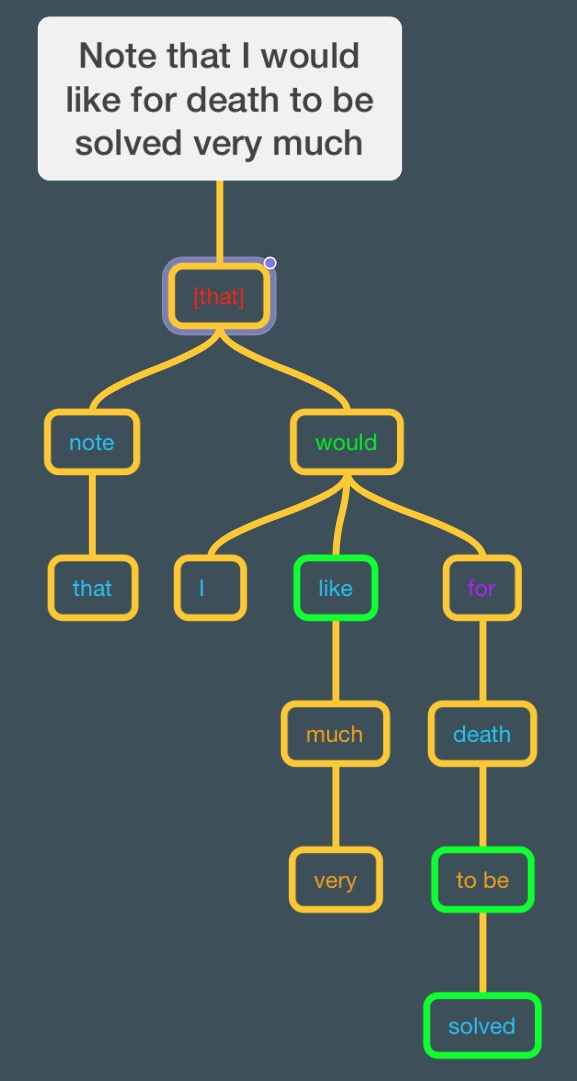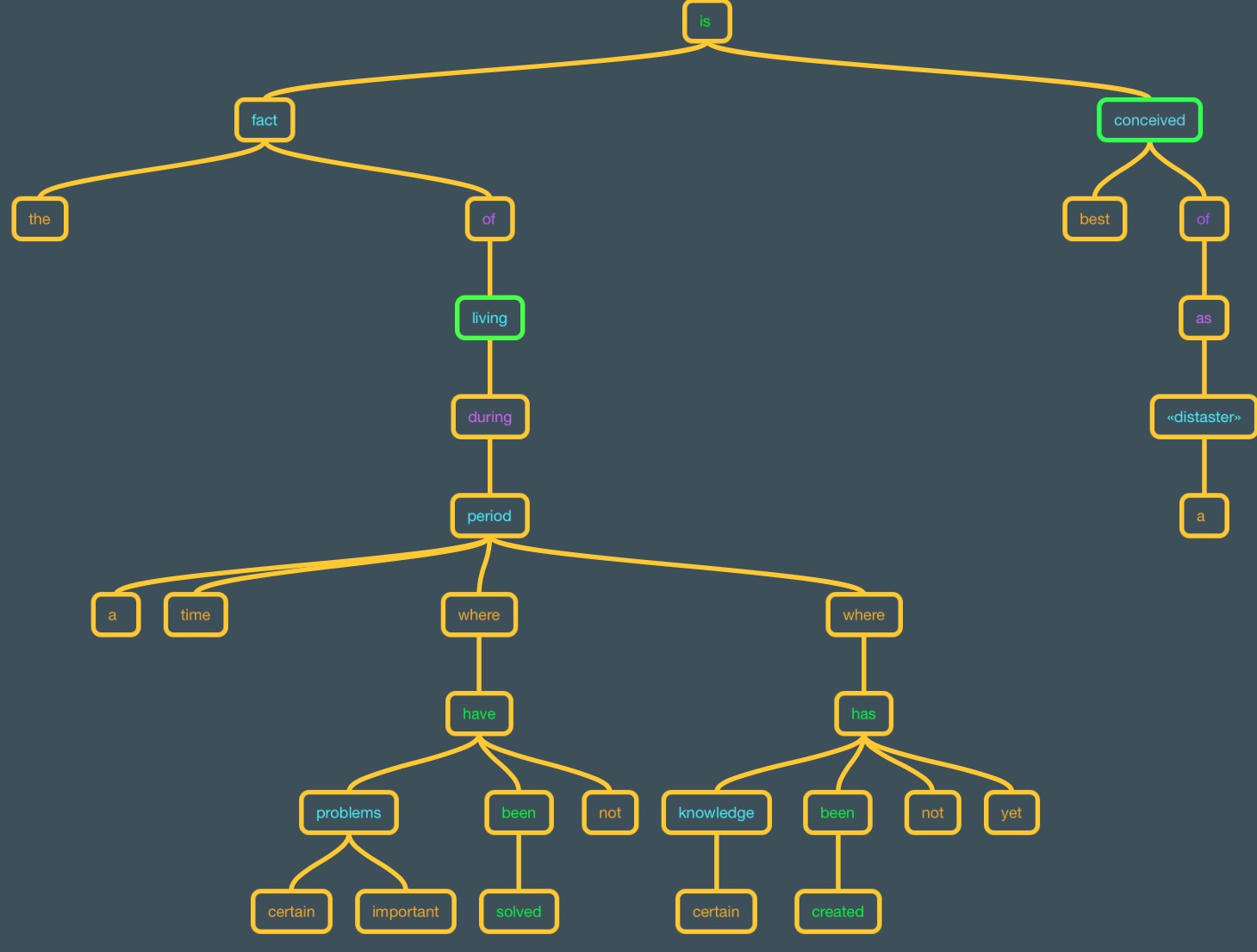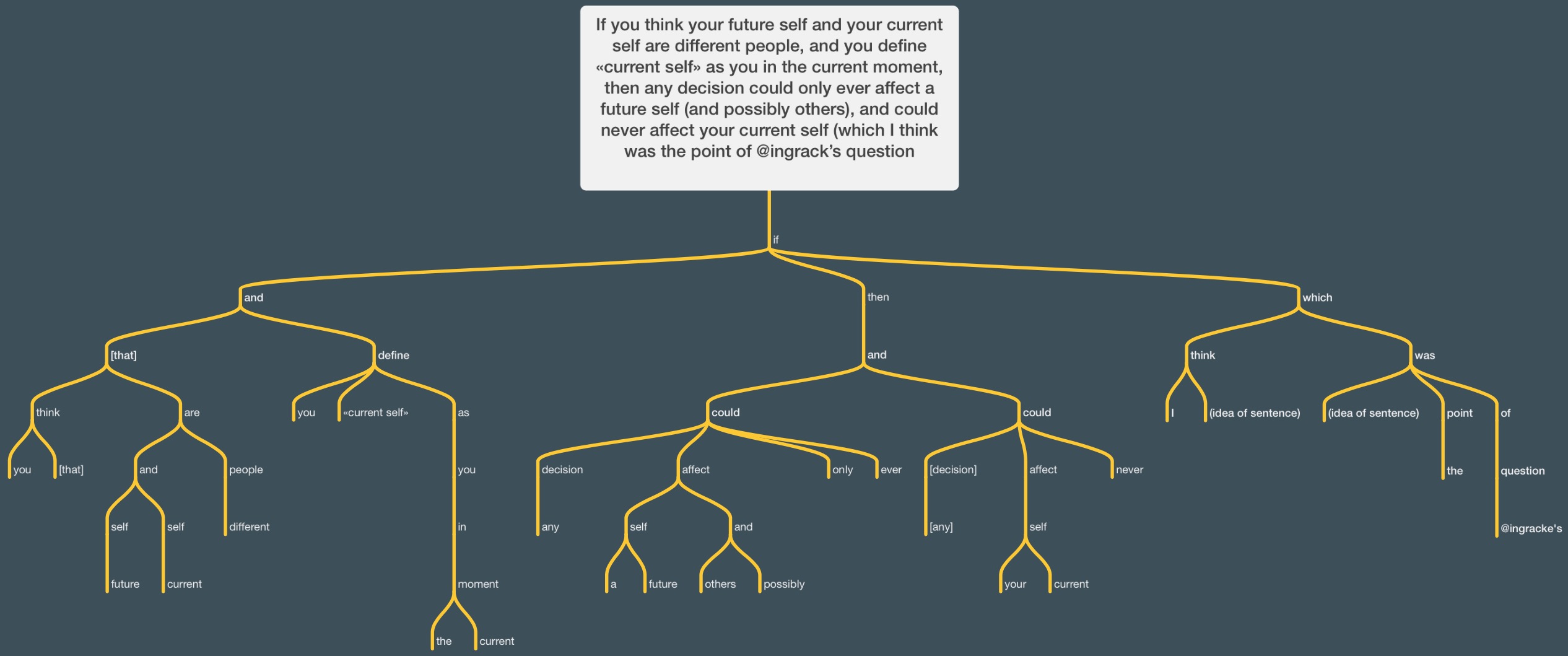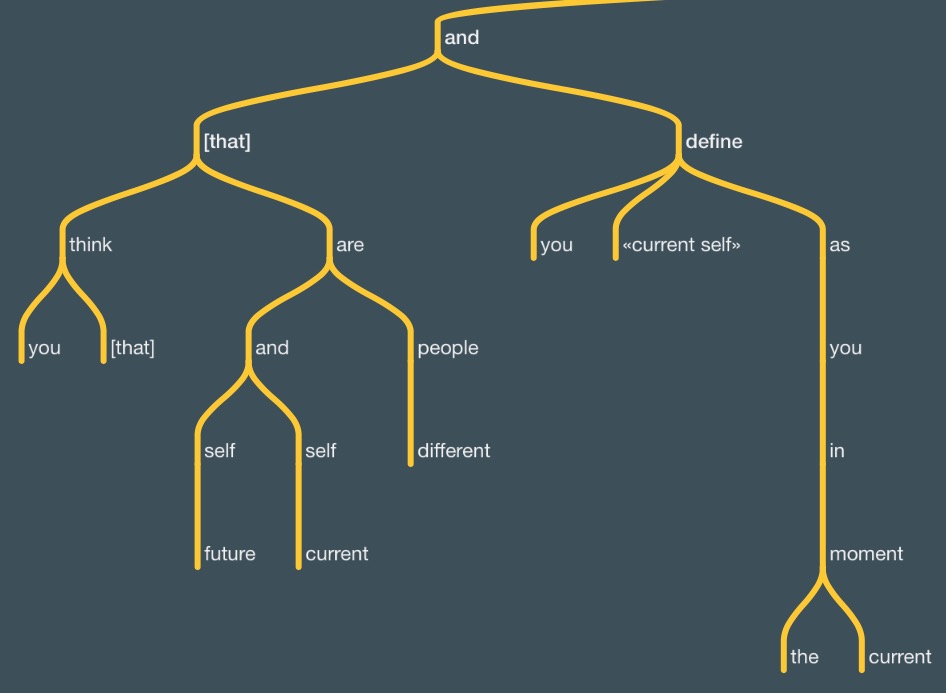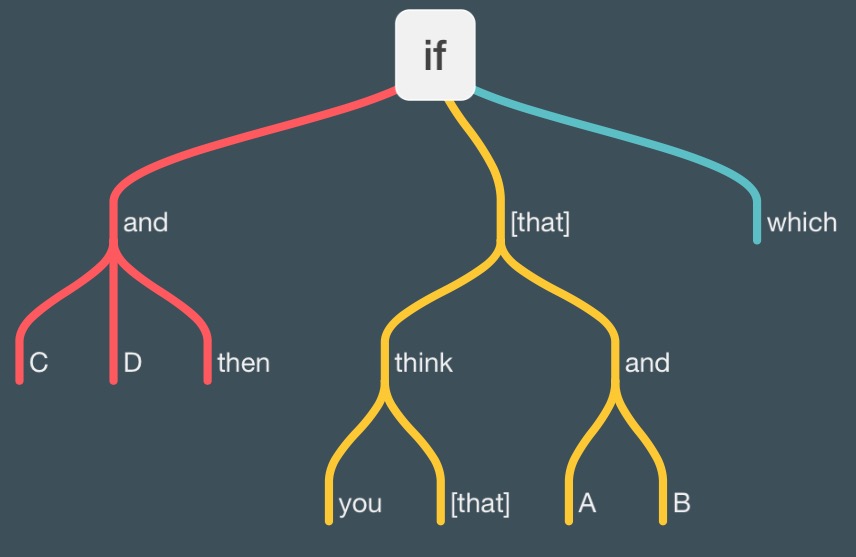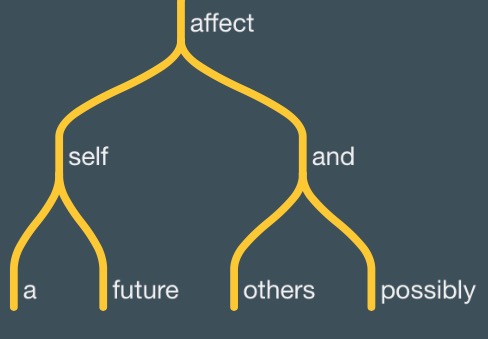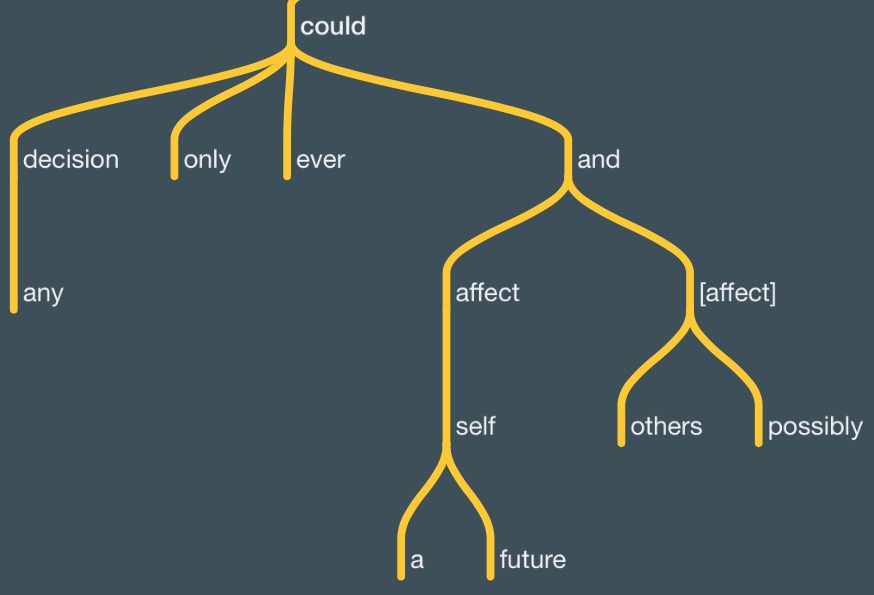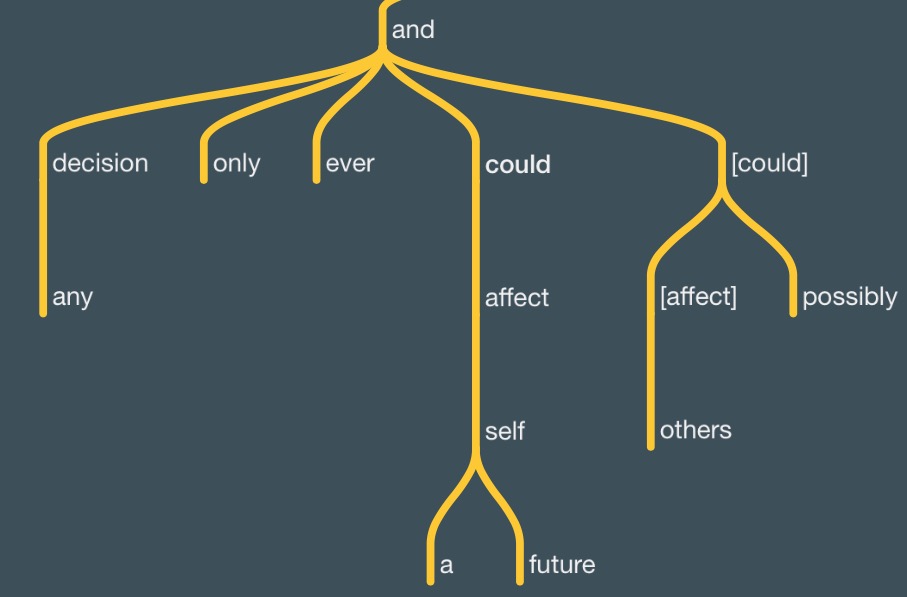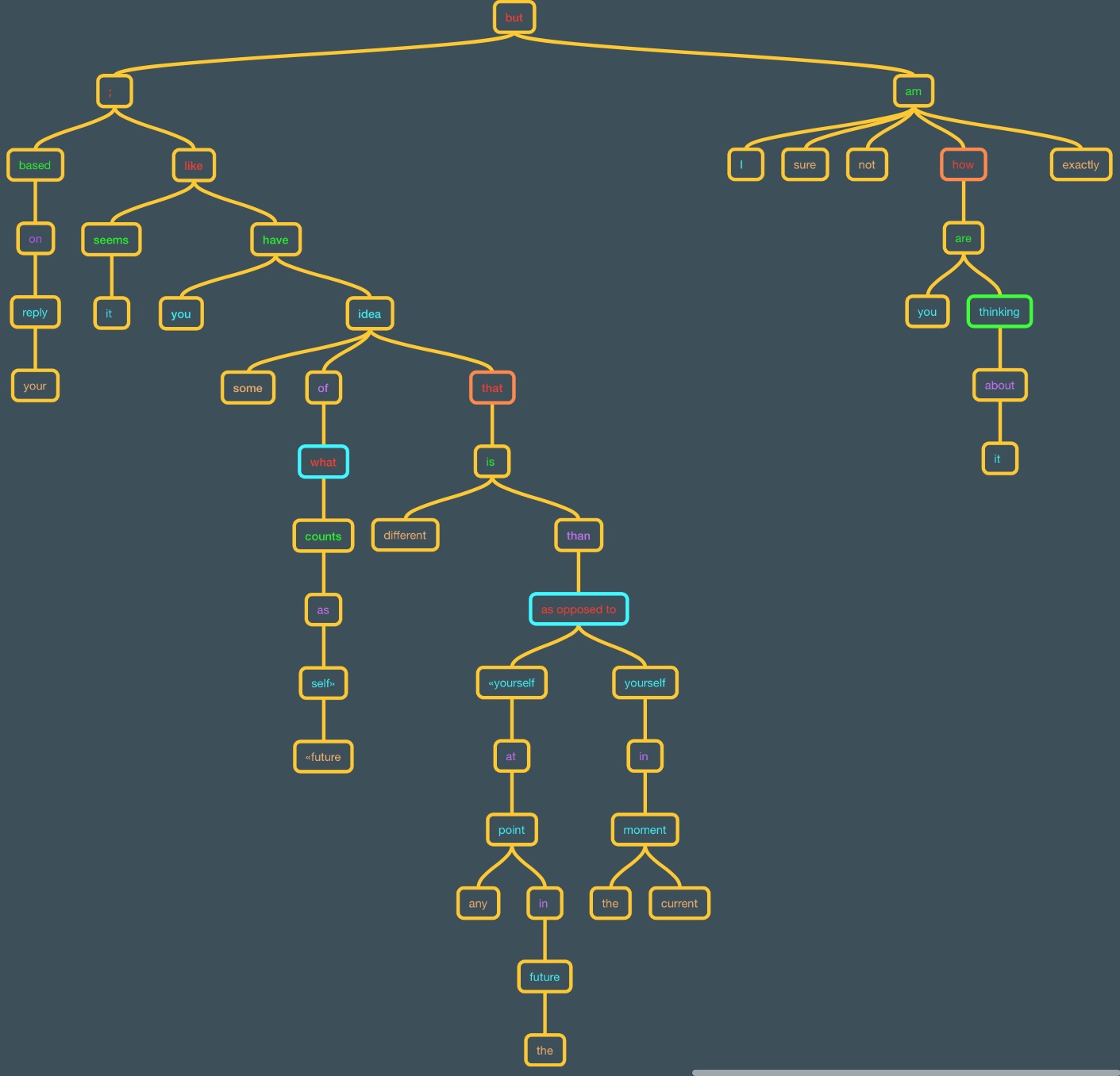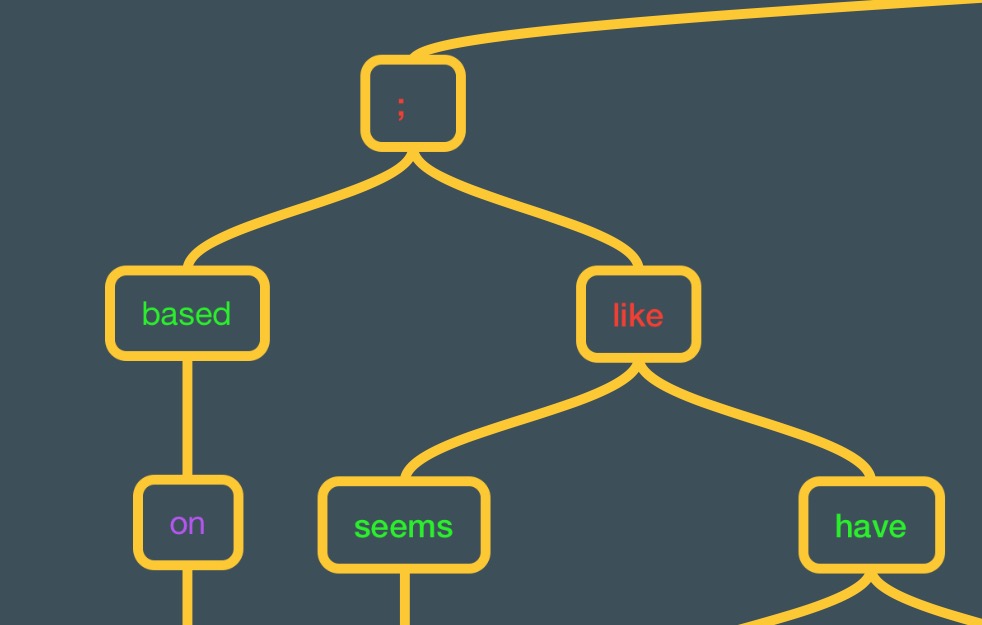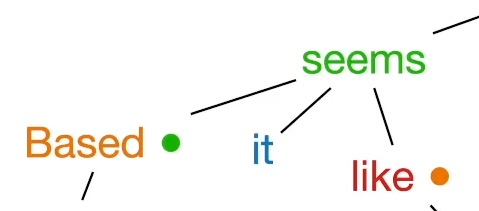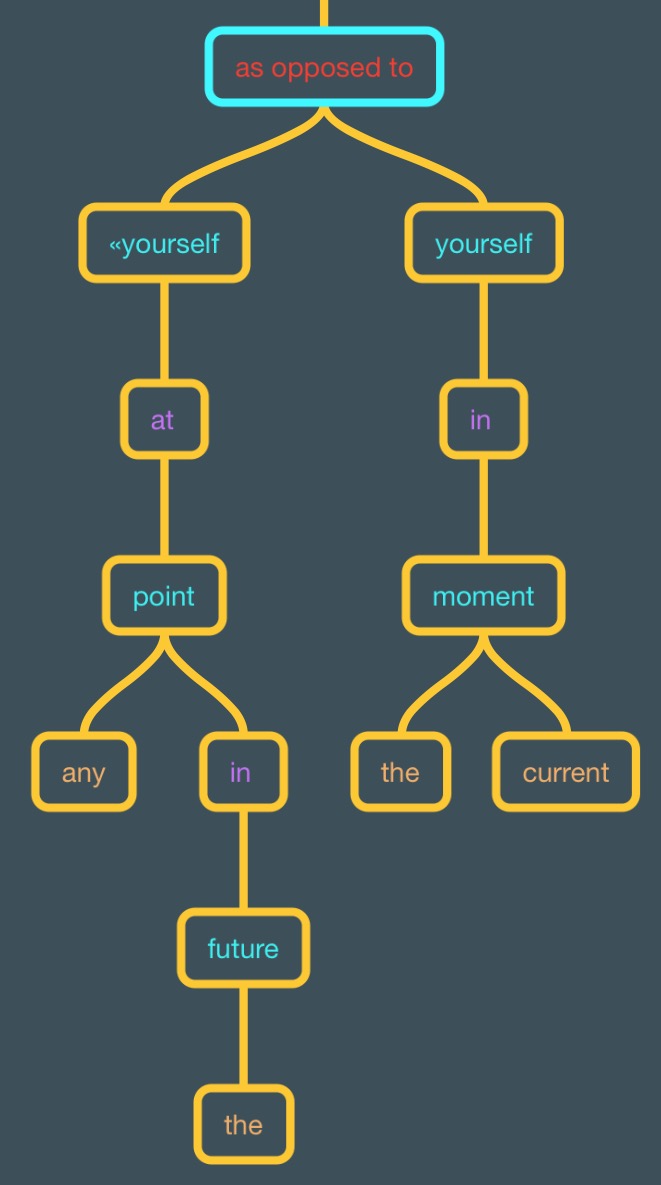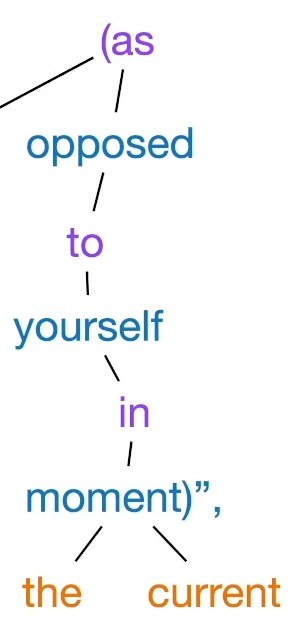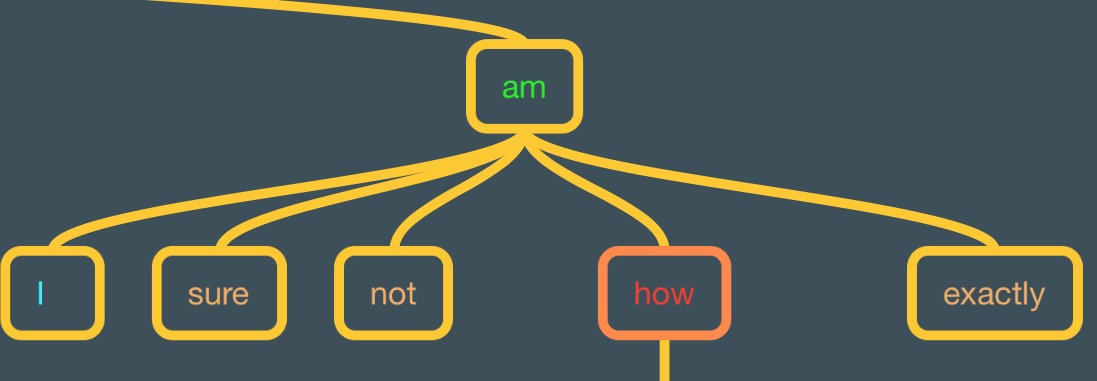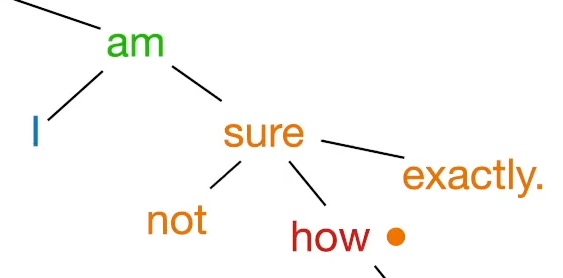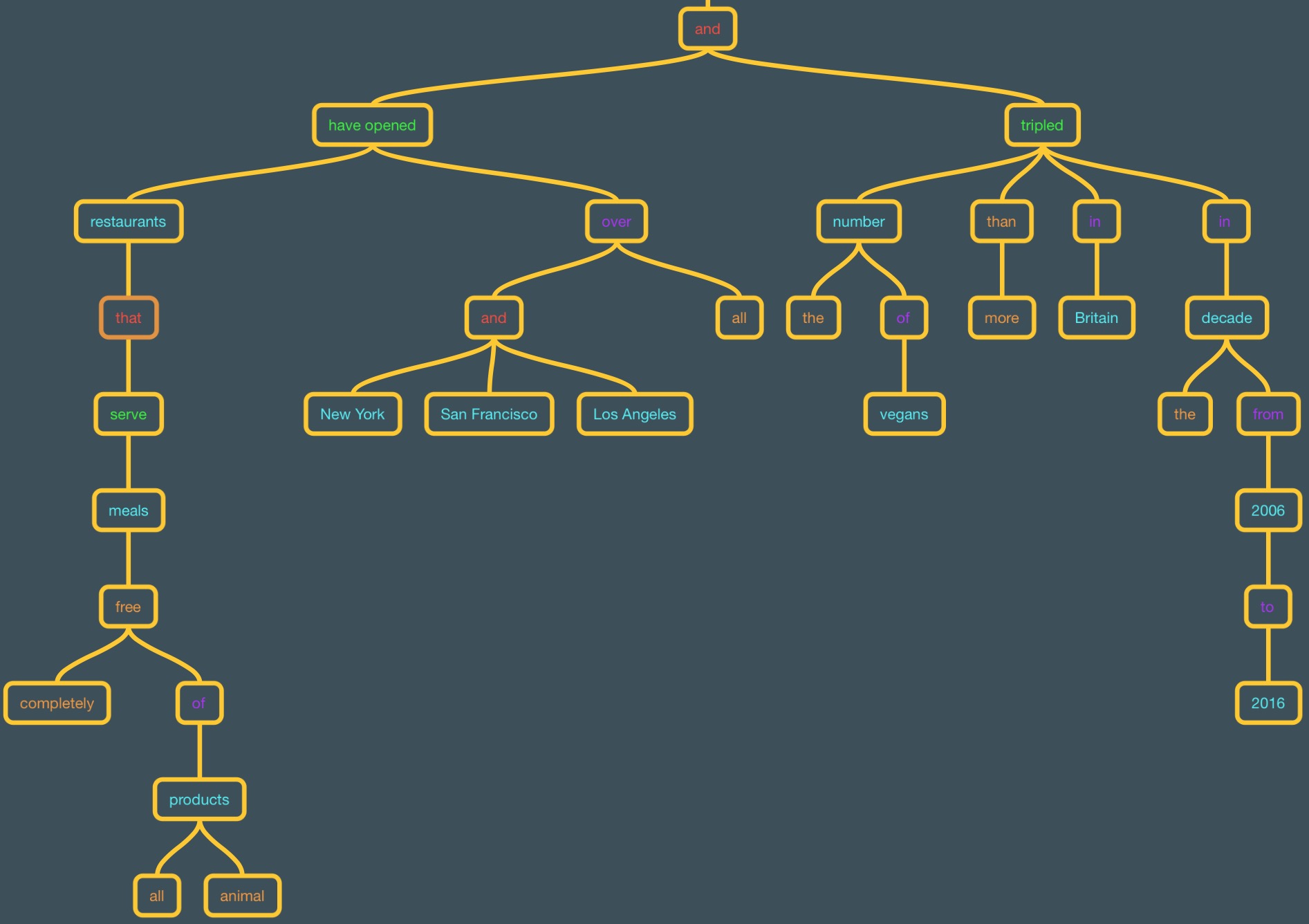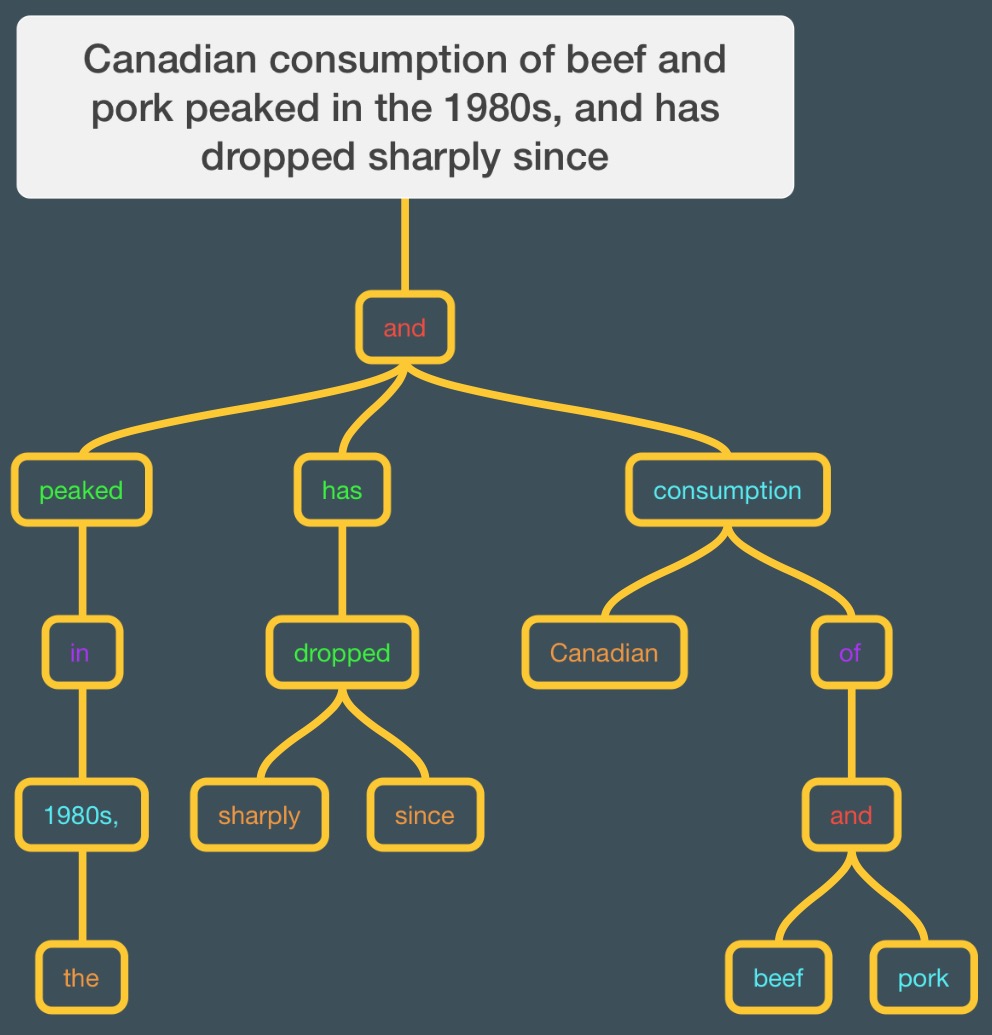I’ve done a tree, but wont post it just yet cos I think the blur spoiler might reveal too much.
I think these trees are wrong too. I was thinking about what hint to give, and thought maybe giving you some simpler trees might help? I used these to double check my answer:
I am too drunk to drive
I am anxious to please
I am too anxious to please to drive
Perhaps both infinitives are adjective complements?
- am
- I
- anxious
- too
- to please
- to drive
Yeah I think this is the right tree structure.
I looked up ‘adjective complement’ cos I wasn’t familiar with the term and yeah, I guess that makes sense. They’re modifiers/extra detail of the adjective ‘anxious’.
I think ‘anxious to please’ is a group, and that group is modified by ‘too’ and ‘to drive’.
Project Notes
Yesterday I watched Learn grammar trees (they’re better than sentence diagrams) and did the trees for Practice Grammar with Harry Potter Sentences.
Time table for yesterday:
| Total time | 2:05 | ||
|---|---|---|---|
| grammar tree practice | 2:05 | ||
| \_ meta | 0:06 | ||
| \_ watch grammar tree videos | 1:11 | ||
| \_ grammar tree exercise collections | 0:48 | ||
| \\_ first attempt at exercises | 0:15 | ||
| \\_ error correction | 0:33 |
I did the trees before watching the part of video for that sentence.
I’m typing the quotes from the video.
Ron glared at her as she left.
Harry peered out of the window.
The train did seem to be slowing down.
He could see mountains and forest under a deep purple sky.
Elliot had “under” modifying “and”, which unambiguously means the mountains and forests are under a sky. My version means “see” is under a sky. What does it mean for seeing to be under a sky? It seems ambiguous whether the subject or object is under a sky. My version is technically not wrong, but Elliot’s version is probably better because it’s less ambiguous.
He and Ron took off their jackets and pulled on their long black robes.
I liked Elliot’s method of having the subject modify the “and” more than using implied words.
Ron’s were a bit short for him, you could see his sneakers underneath them.
“Underneath” should modify “sneakers” the same way “under” should modify “and” two exercises ago.
A voice echoed through the train.
>"We will be reaching Hogwarts in five minutes’ time.
I wasn’t sure what to do with “time”. I don’t think a preposition can have two objects. I should probably have “time” modifying “minutes’” specifying what type of minute it is.
Please leave your luggage on the train, it will be taken to the school separately.
Harry’s stomach lurched with nerves and Ron, he saw, looked pale under his freckles.
They crammed their pockets with the last of the sweets and joined the crowd thronging the corridor.
The train slowed right down and finally stopped.
People pushed their way toward the door and out on a tiny, dark platform.
I don’t remember whether I made both trees before watching that part of the video. I think “toward” and “out” are describing the same movement relating to the door. I think the correct tree is the right but “door” should the child of “and”, or there should another implied “door” to be the object of “out”
Harry shivered in the cold night air.
Then a lamp came bobbing over the heads of the students, and Harry heard a familiar voice:
“Then” is an adverb and should modify “and” instead.
Attempts (before seeing Elliot do them) for sentences in Learn to analyze writing (with grammar trees):
I used colored borders the way Elliot uses colored dots.
I don’t know why I didn’t include the implied “you”. I think I had it there at one time.
“For” should modify “like” instead of “would”. “Like for death to be solved” makes sense, “would for death to be solved” does not.
Is the fact of living during a time period where certain important problems have not been solved, where certain knowledge has not yet been created, best conceived of as a «disaster»
I put the "where"s as modifiers because they were called relative adverbs. I see it makes sense to think of them more as conjunction because they can add another clause. Red text with orange border would be better.
Does a preposition have to have a prepositional object? I think it must. In that case “of as” should be a single node.
Attempt at tree in Philosopher breaks down tough sentence | Learn how to do it
I agree that it’s better to order the clauses of an if statement according to main clause and subordinate clause. I didn’t think about that when I made my tree.
I think “[that]” should be the root of this sub-tree. So “are” and “define” should be the children of “and”.
I rewatched the video and this time I noticed that Elliot corrects himself at 25:39. I noticed the same error while going over the difference in my tree and his, and then I started writing for why it was an error. I left in a part of what I wrote.
I don’t see how “[that]” as the root of entire tree makes sense. In Elliot’s case the tree states that Justin tells Max what Max thinks. That would make sense if the sentence started “You think [that] if…” (leaving out the implied “that” is more awkward), but the sentence is “If you think [that]…”. My outline summary of the sentence would be: If {you think {A and B}}, then {C and D}.
Simplified tree:
I was quite uncertain of this one. At one time I had it like Elliot had:
I couldn’t find any definition of “possibly” as an adjective, I could only find it as an adverb. My tree is breaking two grammar rules anyway: “and” joining a noun and an adverb, and having a second object for “affect”. It’s an interjection, which can create unusual links. So I think Elliot’s version makes more sense as a tree.
I tried other things as well like having another implied “affect” to which the “possibly” would modify. Those didn’t work, but I just thought of an idea where this works:
Or maybe we need another “could” as well:
The sentence fragment would be
any decision could only ever affect a future self (and could possibly affect others).
Project Notes
Time table for yesterday:
| Total time | 2:08 | ||
|---|---|---|---|
| grammar tree practice | 2:08 | ||
| \_ meta | 0:12 | ||
| \_ watch grammar tree videos | 1:56 |
Time table for today:
| Total time | 2:28 | |
|---|---|---|
| grammar tree practice | 2:28 | |
| \_ meta | 0:39 | |
| \_ grammar tree videos | 1:49 |
I removed the “watch” from “watch grammar tree videos” because most of the time is spent creating the trees before watching Elliot do them. Today I only spent the time trying to error correct my trees.
Reviewing a couple things without rewatching the videos:
"We will be reaching Hogwarts in five minutes time.
I think the sentence has a typo. The tree and discussion has minutes’ with an apostrophe.
What I wanted to say is: possessive words aren’t nouns.
you don’t have the sentence in the post text so i quoted this.
i think maybe the “be” is the prepositional object not “death”. it’s hard to find good grammar information on this topic.
Adding an implied verb fixes this.
Yes, I edited it to have an apostrophe now.
So “time” is the child of “in”, and minutes’ modifies “time”. I think “five” still has to modify minutes’.
You did that in the video, I must’ve missed that difference, otherwise I think I would’ve commented on it.
That part of the tree should mean the idea/possible situation of death being solved. I think my tree does say that, but “death” being the subject of “to be” makes the meaning clearer.
With my tree “death” is modified by “to be”, which is modified by “solved”. I can’t really tell the meaning of that. Elliot’s version is much easier to understand.
Did you like my proposals with implied words?
Project Notes
I tracked this under “grammar tree videos”, it took 30 minutes. Most of the time was spent on thinking about the meaning of “death” being modified by “to be”.
Watching Demonstrating a type of grammar analysis (dependency trees)
Based on your reply, it seems like you have some idea of what counts as «future self» that’s different than «yourself at any point in the future (as opposed to yourself in the current moment)», but I’m not sure how you’re thinking about it exactly.
I hadn’t come across a nonfinite verb acting as an adverb before, so I assumed “based” had to have a conjunction to join it into the sentence. I also thought that since it ended in “-ed”, it had to be a participle if it was a nonfinite verb. Therefore I thought it would have to act as an adjective. Although I thought it seemed more like it was modifying the “like” group or “seems”. I think it modifying “seems” makes most sense.
Checking the Nonfinite Verbs blog:
In terms of the roles words have in a sentence, nonfinite verbs function as a noun or modifier.
Participles are modifiers which normally end in “ing” (present tense) or “ed” (past tense).
So participles can act as adverbs and modify verbs? There is disagreement in participle as adverb thread, but I think in the first example “screaming” is acting as an adverb:
She ran screaming out of [the] room.
vil posted more examples.
Now for “like”: I assume @Elliot thinks “like” is a relative adverb here. I couldn’t find a definition for it as a relative adverb, but It was definitely connecting two clauses so I concluded it had to be a conjunction. However the New Oxford Dictionary entry for “like” as conjunction doesn’t match the meaning of the sentence:
conjunction
1 in the same way that; as: people who change countries like they change clothes.
2 as though; as if: I felt like I’d been kicked by a camel.
I couldn’t really find a single dictionary entry that I thought fit the use of “like” here. I think it tells us what it seems like. I think my tree says that “it seems” is similar to “you have some idea…”, which isn’t what the sentence is saying. I think having “like” modify “seems” gives the meaning of what it seems like. So I like the way Elliot had it more.
Question based analysis:
What’s the action? Seems
What seems? It
It seems what? Like
Like what? You have some idea…
I did consider to have it like Elliot had it, but I could only find definitions of “opposed” as an adjective. New Oxford Dictionary had a definition for it as a phrase:
as opposed to
distinguished from or in contrast with: an approach that is theoretical as opposed to practical.
I thought that matched the meaning. This phrase seems like it could either be acting as a conjunction or a relative adverb/pronoun. It has to contrast two things at least.
I think “as opposed to” could either modify “than”, as conjunction, or "yourself, as relative pronoun.
I think it has to be single node instead of three nodes because “opposed” can’t be a noun.
The adverbs should modify “sure” like Elliot has it.
This was my first ever scripted video. Let me know how you liked it.
I noticed it was scripted, but I liked it. I thought the presentation and structure of the video was logical and easy to follow.
I left the error in the video.
I like that you have done that in these videos. I think I made every mistake you made at some point in my process.
I liked the rewrite part. I think I’ll try to rewrite the other two difficult sentences as practice.
I liked how you showed and explained your process in this three part video series. My process was quite linear/straightforward, your method focused more on overall core structure.
I liked seeing how you corrected your errors. You had different steps which only needed to be good enough to be useful and to move on to the next step. The errors of each step could be corrected in a later step.
I also liked attempting these challenging sentences even though I made lots of mistakes and it took a long time.
Project Notes
Time table for today:
| Total time | 3:56 | |
|---|---|---|
| grammar tree practice | 3:56 | |
| \_ meta | 0:08 | |
| \_ grammar tree videos | 3:48 |
You’re right that “opposed” isn’t a noun. Using a phrasal definition isn’t wrong, but I generally avoid those unless I can’t find another option. There’s usually underlying word grammar that makes sense that I’d like to understand. In this case, I think the solution is that “as” is an adverb not a preposition.
AS Definition & Meaning - Merriam-Webster
: when considered in a specified form or relation —usually used before a preposition or a participle
my opinion as distinguished from his
so “as” is a child of the adjective “opposed” instead of its parent. “to” remains a child of “opposed” too.
Watching Sentence Grammar Tree Practice with a Peter Singer Article
I liked how this showcases the sloppiness of a popular intellectual, both in grammar and graph use/description.
I could guess what Singer had to mean, but the sentences ought to unambiguously and objectively match his intent.
I think the video is a nice example of the usefulness of grammar trees.
Attempt at trees
I didn’t catch the comma mistakes Singer made. I interpreted the sentences with the correct comma use without knowing it.
Restaurant that serve meals completely free of all animal products have opened all over New York, San Francisco and Los Angeles, and in Britain, the number of vegans more than tripled in the decade from 2006 to 2016.
Some adverbs can modify certain prepositions but I couldn’t figure out whether “all” can modify “over” specifically as a matter of grammar rules. If it can, I prefer it to “over” modifying “all”. “Over” tells us where the restaurants opened, and “all” tells us that they were opened pretty much everywhere in those places.
Canadian consumption of beef and pork peaked in the 1980s, and has dropped sharply since.
I was thinking of “has dropped” as auxiliary and main verb. New Oxford Dictionary on “has” as auxiliary verb:
used with a past participle to form the perfect, pluperfect, and future perfect tenses, and the conditional mood:
So “dropped” should have orange text and a green border to indicate that it’s a main verb.
As far as I know, verb chains (like “will have been eating”) always have one finite verb, which is always the first verb. The other verbs are non-finite (and they’re each the object or complement of the preceding verb). To have multiple finite verbs in a clause, you need a conjunction, like “I ran, swam and biked.” So you’ll never have a green (finite verb) node with a green child.
Also, in general, “have” isn’t a linking verb. It takes a noun object:
I have chocolate.
She has steak.
And using adjectives doesn’t work. (For this kind of test, you want adjectives that can’t also be nouns and aren’t participles.)
I have agreeable.
She has awful.
Those are wrong.
So why then does a past participle (adjective) like “dropped” go after “has”? And a gerund (noun) doesn’t?
It has dropped.
He has swam.
It has dropping.
He has swimming.
The first two with participles work and the last two with gerunds don’t work. Also I don’t think you can put a present participle after “has”, just a past participle.
Why? Is it just a special case? One thing to consider is whether there are multiple different definitions of “have” involved.
I think a standard explanation is just to assert, as an arbitrary rule, that “have + past participle = present perfect tense”. I saw some grammar webpage saying that. And here’s New Oxford Dictionary giving a special definition for “have” where it’s defined, not with any meaning of its own, but simply as a special grammar word for forming three tenses and a mood:
auxiliary verb
used with a past participle to form the perfect, pluperfect, and future perfect tenses, and the conditional mood: I have finished | he had asked her | she will have left by now | I could have helped, had I known | “Have you seen him?” “Yes, I have.”.
Webster’s 1913 dictionary is more use:
☞ Have , as an auxiliary verb, is used with the past participle to form preterit tenses; as, I have loved; I shall have eaten. Originally it was used only with the participle of transitive verbs, and denoted the possession of the object in the state indicated by the participle; as, I have conquered him , I have or hold him in a conquered state; but it has long since lost this independent significance, and is used with the participles both of transitive and intransitive verbs as a device for expressing past time. Had is used, especially in poetry, for would have or should have .
So I guess there may not be a good principle for modern usage. It sounds like “have” originally had a limited usage with participles that made sense, then the usage was expanded, for convenience, to cases that make less sense.
OED has
II. As an auxiliary verb. As in the other Germanic (and Romanic) languages, the various moods and tenses of have are used with the pa.pple. of another verb, to form a series of compound or ‘perfect’ tenses of the latter, expressing action already finished at the time indicated, and answering to the Latin perfect tenses dedi, dederam, dedero, dedisse, etc.
This use arose directly from sense 2 b, the object possessed having in agreement with it a passive participle of a transitive verb as attribute or complement; thus, I have my work done= ‘I possess or have my work in a done or finished condition’, whence, by inference of antecedent action from result, the actual sense ‘I have done my work’: cf. the series ‘have you the article ready?’, ‘have you the article completed?’, ‘have you completed the article?’ In some dialects the distinction between the original and developed forms, e.g. ‘He has the house built’, ‘he has built the house’, is still in regular use; with some past participles, as begun, completed, done, finished, etc., it is recognized generally. With transitive verbs the developed use was already frequent in OE.; the pa.pple., which originally agreed in number and case with the object, was sometimes left uninflected. In early ME. the usage is found with verbs of action without an object, whence it was extended to intransitive verbs, especially, at an early date, to the verb to be (as in French and other Romanic languages, and in opposition to continental Teutonic use), as he has been, had been, will have been, etc. (cf. F. il a été, Ger.er ist gewesen). Verbs of motion and position long retained the earlier use of the auxiliary be; and he is gone is still used to express resulting state, while he has gone expresses action. See be 14 b.
I was wondering why “has” could take a past participle but seemingly not an adjective. So I researched it a bit and settled with the New Oxford Dictionary entry, still confused. I could have posted some of my thoughts and research, and asked about it here. Thanks for your research.
I think ‘all’ does modify ‘over’.
Project Conclusion
The last stuff I did was 5 days ago, which was 21 days since I started the project. I had originally thought to do a 2-3 week long project, even though I said:
I was done with the grammar tree videos and I thought I would rather end the project than start on a new set of exercises.
Here’s the time table for the full project.
| Total time | 37:17 | ||
|---|---|---|---|
| grammar tree practice | 37:17 | ||
| \_ meta | 4:52 | ||
| \\_ fill in project template | 1:29 | ||
| \\_ project conclusion | 1:21 | ||
| \_ review grammar material | 2:53 | ||
| \\_ FI article | 2:53 | ||
| \_ topics to research | 3:02 | ||
| \\_ using commas | 3:02 | ||
| \_ grammar tree videos | 10:55 | ||
| \_ grammar tree exercise collections | 14:14 | ||
| \\_ first attempt at exercises | 9:43 | ||
| \\_ error correction | 4:31 |
It seems I did some significant work on 15 out of those 21 days. For the 21 days I did roughly an average of 1 hour and 45 minutes each day, and roughly 2 hours each day for the 15 days where I actually did something.
Success Evaluation
I made notes for the FI article and went through all the grammar videos (I’m saving the ones with paragraph analysis and the core grammar video for a later project), but I only did one set of grammar exercises. Making sets of grammar exercise the criteria was a stupid choice since the sets are different length. It would’ve been better to take number of exercises done or time spent doing exercises. Anyway, according to the success criteria I failed. I’m still quite satisfied with my progress and how it turned out.
My success criteria was just about doing a certain amount, so the failure came from not being organized enough. If I had done grammar work as early as I could each day I could have done 2 hours on every day and I could have done another set of exercises, and thus fulfilling my success criteria. I could also have actually scheduled my days and when to do grammar sessions.
Benefits of the Project
- I think my grammar diagramming skill has improved
- I had many errors in the difficult sentences from the grammar tree videos, but I think my trees were closer to the correct ones than I would have had before this project
- I learned new grammar concepts:
- expletives: words that don’t add meaning but change emphasis
- appositives: noun phrase enclosed by commas that can modify the noun phrase it comes after
- relative pronoun: a word that can modify a noun with a clause
- relative advert: a work that can modify other things with a clause
- using commas (though I need practice and revision)
- adjective complements: phrase or clause that modifies an adjective. Really just adverbs, but it’s easier to catch a single adverb than a clause/phrase acting as an adverb
I think I can use my grammar skills to help out in some philosophy learning that I will do. I can only do easy sentences at near instant speed. I think I should at least get to the level where I can do medium level sentences at instant speed. I should also learn to analyze difficult and long sentences with a core and structural approach the way Elliot did in his grammar tree videos.
Next Projects
I think I’ll go through the Peikoff grammar course, and Elliot’s material on that, in my next grammar project. After that I’ll start on paragraph analysis. I’ll do some higher level stuff in between these projects. I don’t know whether I’ll do projects on high level stuff or just some activities.
Other Notes
I’ve enjoyed doing grammar more than I thought I would.
If people have criticism of stuff I did in the project then I’m happy to figure them out and do some error correction. I just won’t start on any new exercises.
